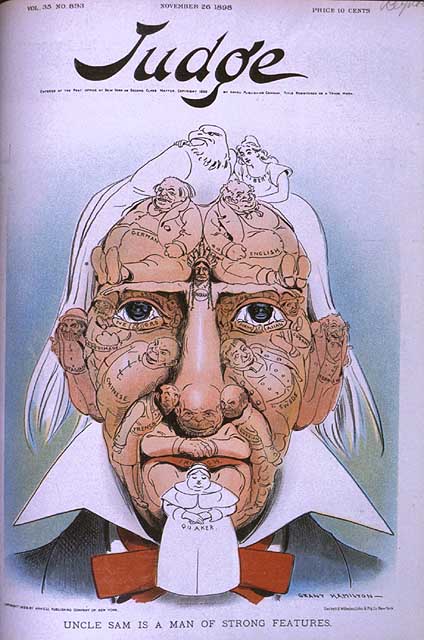I think that our first discussion about “Bread Givers” went well. The class looked interested in the questions, and the topic that generated the most responses was the adaptation of the Smolinsky’s family to the American norms.
My classmates said that the seniors in the family haven’t adopted to the norms in the new country, but the girls’ behavior is more modern. The daughters wanted to pick their own husbands and they couldn’t understand why they have to deal with a strong, almost tyrannical father. We also noticed that the mother laments that she had to give up a lot in order to live in America. She remembers the feather beds and her expensive tablecloths. Somebody noticed that Yezierska is pointing out at the special handmade tablecloth that is a marker of the old country’s wealth and culture. The mother said in the novel that she couldn’t be happy in America, even if she had Rockefellers’ money, because she was not able to buy this tablecloth.
At the same time the class pointed out that the family dreamed about something that seems to be a purely new American concept- about owning a business and a house. The discussion however lead us to the conclusion that owning a business is also important in the Jewish culture, and this idea doesn’t have to be new for the family.
I would also like to comment on something I said during our second day discussion. When we talked about the way characters build sentences I said that in my native language the order of words in the sentence doesn’t matter. I was thinking about it during the weekend and I decided this comment was incorrect and that I have to clarify that. I haven’t taken Polish grammar class since elementary school and in addition to that, sometimes it’s hard to explain something, which is natural and obvious. We actually have an order of words: it’s standard Subject + Verb + Object, but it is very flexible. Each word has a feminine or masculine distinction, so it is very easy to move words around. We can also drop words. It is possible with subject, verb and object. Some models of the sentences are more popular than the others, but all of them are still correct. It is possible to say something by building a sentence in this model: Object + Verb + Subject or Subject + Object + Verb. It is probably a chaotic concept for a native speaker of English language, who is used to the fact that the position of each word is extremely important.

I definitely see a great amount of folklore within Bread Giver. While I am not familiar with 20th century Eastern European fairytales or the morals they might have involved (though I have a feeling a great deal of them were mangled in the religious rhetoric of the father), I can still decipher folklore nonetheless.
ReplyDeleteThere is Lower East Side folklore; the geographical set up, “neighborly” inquisitiveness, the way the stores accept and decline credit and buy from Sara off the street corner. I feel I’ve gotten an inside look, during a time and a place I’ve no relation to.
There is feminine folklore; from the way they polish and cover when company comes over, to Mashah’s little personal alterations. That these things seem totally natural to us, with dozens of shoes to choose between, it is described as a very intricate thing the poor women of the LES hope to recreate with their means.
There is speech folklore; did people really say “Woe is me”? Ever? Really? Among other phrase that seem unrealistic to us now, came from this time and place.
Anything that is a tradition: food, no piano on the Sabbath, Arranged marriages, lodge money, etc.
These are smaller branches of the larger –Eastern European 20th Century American Immigrant-, which every group would identify with. I’m sure anyone 100-120 years old would have identical recollections of the larger group & personal smaller ones of the former.